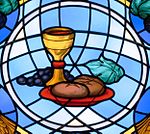Impanation
| Part of a series on the |
Eucharist Lord's Supper • Communion |
|---|
 |
Elements |
|
Ritual and liturgy |
|
Practices and customs |
|
History |
|
Theology |
|
Denominational teachings |
|
Related articles |
|
Impanation (Latin, impanatio, "embodied in bread") is a high medieval theory of the real presence of the body of Jesus Christ in the consecrated bread of the Eucharist that does not imply a change in the substance of either the bread or the body.[1] This doctrine, apparently patterned after Christ's Incarnation (God is made flesh in the Person of Jesus Christ),[2] is the assertion that "God is made bread" in the Eucharist. Christ's divine attributes are shared by the eucharistic bread via his body. This view is similar but not identical to the theory of consubstantiation associated with Lollardy. It is considered a heresy by the Roman Catholic Church[3] and is also rejected by classical Lutheranism.[4]Rupert of Deutz (d. 1129) and John of Paris (d. 1306) were believed to have taught this doctrine.[3]
Notes
^ Wm. A. Neilson, ed., Webster's New International Dictionary of the English Language, second edition, (Springfield, MA: G. & C. Merriam Co., pub., 1936), 1247 sub loco: "the inclusion of the body of Christ in the Eucharistic bread and wine, conceived of as a union without change in any substance; distinguished from transubstantiation and consubstantiation."
^ John 1:14
^ ab Herbermann, Charles, ed. (1913). "Impanation". Catholic Encyclopedia. New York: Robert Appleton Company..mw-parser-output cite.citation{font-style:inherit}.mw-parser-output q{quotes:"""""""'""'"}.mw-parser-output code.cs1-code{color:inherit;background:inherit;border:inherit;padding:inherit}.mw-parser-output .cs1-lock-free a{background:url("//upload.wikimedia.org/wikipedia/commons/thumb/6/65/Lock-green.svg/9px-Lock-green.svg.png")no-repeat;background-position:right .1em center}.mw-parser-output .cs1-lock-limited a,.mw-parser-output .cs1-lock-registration a{background:url("//upload.wikimedia.org/wikipedia/commons/thumb/d/d6/Lock-gray-alt-2.svg/9px-Lock-gray-alt-2.svg.png")no-repeat;background-position:right .1em center}.mw-parser-output .cs1-lock-subscription a{background:url("//upload.wikimedia.org/wikipedia/commons/thumb/a/aa/Lock-red-alt-2.svg/9px-Lock-red-alt-2.svg.png")no-repeat;background-position:right .1em center}.mw-parser-output .cs1-subscription,.mw-parser-output .cs1-registration{color:#555}.mw-parser-output .cs1-subscription span,.mw-parser-output .cs1-registration span{border-bottom:1px dotted;cursor:help}.mw-parser-output .cs1-hidden-error{display:none;font-size:100%}.mw-parser-output .cs1-visible-error{font-size:100%}.mw-parser-output .cs1-subscription,.mw-parser-output .cs1-registration,.mw-parser-output .cs1-format{font-size:95%}.mw-parser-output .cs1-kern-left,.mw-parser-output .cs1-kern-wl-left{padding-left:0.2em}.mw-parser-output .cs1-kern-right,.mw-parser-output .cs1-kern-wl-right{padding-right:0.2em}
Herbermann, Charles, ed. (1913). "Impanation". Catholic Encyclopedia. New York: Robert Appleton Company..mw-parser-output cite.citation{font-style:inherit}.mw-parser-output q{quotes:"""""""'""'"}.mw-parser-output code.cs1-code{color:inherit;background:inherit;border:inherit;padding:inherit}.mw-parser-output .cs1-lock-free a{background:url("//upload.wikimedia.org/wikipedia/commons/thumb/6/65/Lock-green.svg/9px-Lock-green.svg.png")no-repeat;background-position:right .1em center}.mw-parser-output .cs1-lock-limited a,.mw-parser-output .cs1-lock-registration a{background:url("//upload.wikimedia.org/wikipedia/commons/thumb/d/d6/Lock-gray-alt-2.svg/9px-Lock-gray-alt-2.svg.png")no-repeat;background-position:right .1em center}.mw-parser-output .cs1-lock-subscription a{background:url("//upload.wikimedia.org/wikipedia/commons/thumb/a/aa/Lock-red-alt-2.svg/9px-Lock-red-alt-2.svg.png")no-repeat;background-position:right .1em center}.mw-parser-output .cs1-subscription,.mw-parser-output .cs1-registration{color:#555}.mw-parser-output .cs1-subscription span,.mw-parser-output .cs1-registration span{border-bottom:1px dotted;cursor:help}.mw-parser-output .cs1-hidden-error{display:none;font-size:100%}.mw-parser-output .cs1-visible-error{font-size:100%}.mw-parser-output .cs1-subscription,.mw-parser-output .cs1-registration,.mw-parser-output .cs1-format{font-size:95%}.mw-parser-output .cs1-kern-left,.mw-parser-output .cs1-kern-wl-left{padding-left:0.2em}.mw-parser-output .cs1-kern-right,.mw-parser-output .cs1-kern-wl-right{padding-right:0.2em}
^ Formula of Concord, Solid Declaration Article VII, 14–15, 64; cf. also Charles P. Krauth, The Conservative Reformation and Its Theology (Philadelplhia: J.B. Lippincott & Co., 1875), 771.
- This article incorporates text from a publication now in the public domain: Wood, James, ed. (1907). "article name needed". The Nuttall Encyclopædia. London and New York: Frederick Warne.
This Christian theology article is a stub. You can help Wikipedia by expanding it. |